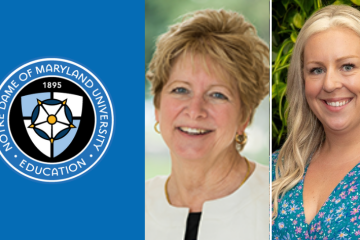New Health Sciences Degree Prepares NDMU Students for Variety of Healthcare Professions

By: Erik Pedersen, Content Strategy Director
BALTIMORE – Notre Dame of Maryland University has launched a new Bachelor of Science degree in health sciences to help meet the continuing demand for healthcare professionals across the United States.
The health sciences program, which debuted during the fall 2023 semester, is the latest innovative offering to position NDMU as a national leader in healthcare education. It joins a list of professional healthcare programs which includes bachelor’s and master’s degrees in nursing, a Doctor of Pharmacy, a Doctorate in Occupational Therapy, a master’s in physician assistant studies and Maryland’s first bachelor and master’s degree programs in art therapy.
“The health sciences program is designed to appeal to a wide range of students,” said Dr. Laura Riley, health sciences coordinator and an assistant professor in NDMU’s Biology Department. “Some might already know that they plan to attend graduate school to obtain a master’s or doctorate degree, while others might know they want to work in healthcare but aren’t sure what path to take yet.
“The program’s first course, Introduction to Health Science, provides background information on several potential professions,” she continued. “We look at audiology, radiology, cardiology, artificial intelligence, coding, etc. – we want to give students a broad overview to help them narrow down what could be a good fit for them.”
The degree consists of 41-43 credit hours in interdisciplinary courses, including courses specifically created for the program. The program’s emphasis on interdisciplinary study, coupled with a liberal arts background, gives students the opportunity to explore different facets of healthcare and health-related professions before entering the workforce or going on to specialized graduate programs in physician’s assistant studies, occupational therapy, or other public health fields.
The learning objectives for the health sciences major complement the objectives for NDMU’s General Education program revision. Both focus on critical thinking, study of diversity and identity, and civic responsibilities. The health sciences program emphasizes the importance of maintaining strong ethical values when providing healthcare services, and demonstrating a sensitivity to culturally diverse populations and their attitudes towards health and healthcare professionals.
Examples of employment opportunities available after graduation include patient care advocates, health service managers, health communicators, health educators, clinical researchers, and public health advocates. Whichever path students choose, they will be prepared to become leaders in healthcare through advanced communication, education, and research skills.
“There is such a broad range of options available for students,” Dr. Riley said. “And NDMU is located in a prime location given the amount of healthcare organizations based in the Baltimore/Washington area. The opportunities provided through our health sciences program are vast, exciting, and topical given the need for healthcare services.”
Established in 1895, Notre Dame of Maryland University (NDMU) is a private, Catholic institution in Baltimore, Maryland, with the mission to educate leaders to transform the world. Notre Dame has been named one of the best "Regional Universities North" by U.S. News & World Report.




